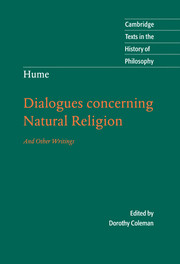Book contents
- Frontmatter
- Contents
- Acknowledgments
- Introduction
- Chronology
- Further reading
- Note on the text
- List of abbreviations
- DIALOGUES CONCERNING NATURAL RELIGION
- Pamphilus to Hermippus
- Part 1
- Part 2
- Part 3
- Part 4
- Part 5
- Part 6
- Part 7
- Part 8
- Part 9
- Part 10
- Part 11
- Part 12
- OTHER WRITINGS
- Index
- Cambridge Texts in the History of Philosophy
Part 1
Published online by Cambridge University Press: 05 June 2012
- Frontmatter
- Contents
- Acknowledgments
- Introduction
- Chronology
- Further reading
- Note on the text
- List of abbreviations
- DIALOGUES CONCERNING NATURAL RELIGION
- Pamphilus to Hermippus
- Part 1
- Part 2
- Part 3
- Part 4
- Part 5
- Part 6
- Part 7
- Part 8
- Part 9
- Part 10
- Part 11
- Part 12
- OTHER WRITINGS
- Index
- Cambridge Texts in the History of Philosophy
Summary
1 After I joined the company, whom I found sitting in Cleanthes' library, Demea paid Cleanthes some compliments, on the great care, which he took of my education, and on his unwearied perseverance and constancy in all his friendships. The father of Pamphilus, said he, was your intimate friend: The son is your pupil, and may indeed be regarded as your adopted son, were we to judge by the pains which you bestow in conveying to him every useful branch of literature and science. You are no more wanting, I am persuaded, in prudence than in industry. I shall, therefore, communicate to you a maxim which I have observed with regard to my own children, that I may learn how far it agrees with your practice. The method I follow in their education is founded on the saying of an ancient, that students of philosophy ought first to learn logics, then ethics, next physics, last of all, the nature of the gods. This science of natural theology, according to him, being the most profound and abstruse of any, required the maturest judgement in its students; and none but a mind, enriched with all the other sciences, can safely be entrusted with it.
2 Are you so late, says Philo, in teaching your children the principles of religion? Is there no danger of their neglecting or rejecting altogether those opinions, of which they have heard so little, during the whole course of their education?
- Type
- Chapter
- Information
- Hume: Dialogues Concerning Natural ReligionAnd Other Writings, pp. 6 - 16Publisher: Cambridge University PressPrint publication year: 2007

